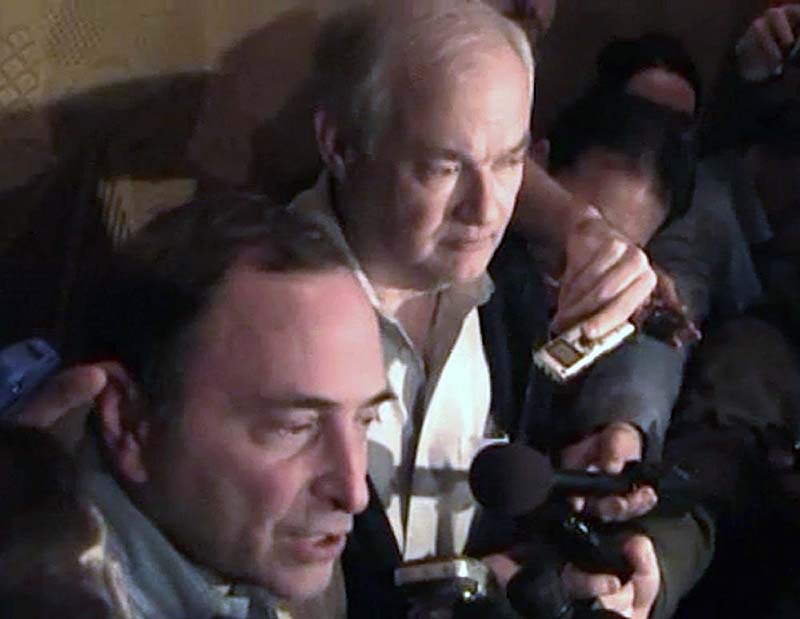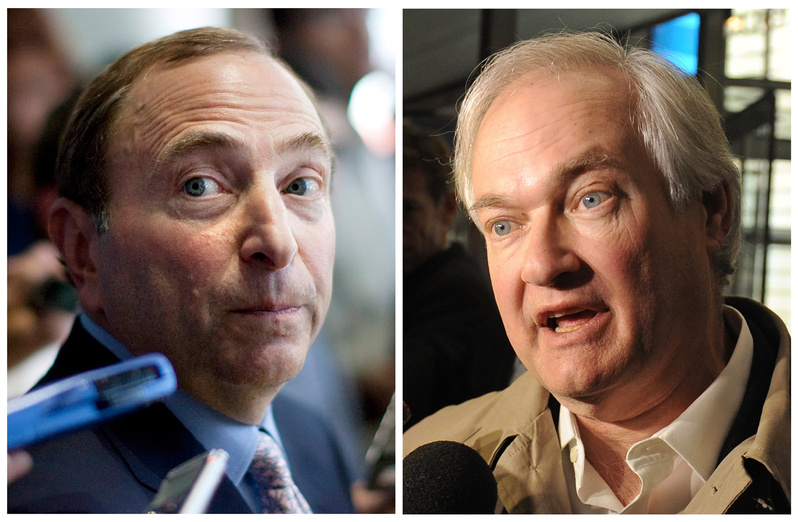Shortly after 5 a.m. Sunday, Washington Capitals forward Jason Chimera woke up to a text message he had been hoping to see for nearly four months. The National Hockey League owners and players union had finally reached a tentative deal on a new labor agreement to salvage a partial season.
Chimera celebrated the end of the team owners’ lockout of players with an impromptu dance and pancake party with his two young children at his home in Alexandria, Va.
“My son asked me, ‘Who unlocked the doors?’ ” said Chimera, 33. “I didn’t know what to say. I just laughed.”
The end of the lockout came after more than 16 consecutive hours of bargaining. Language and legal details still need to be finalized, and then the deal must be ratified by the players union and the league’s Board of Governors before it can become official.
“There’s still a lot of work to be done, but the basic framework of the deal has been agreed upon,” NHL Commissioner Gary Bettman told reporters in New York, while standing alongside Donald Fehr, the union’s executive director.
“Hopefully within a very few days the fans can get back to watching people who are skating, not the two of us,” Fehr said.
The deal in principle is for 10 years, with a mutual opt-out after eight years, in which players and owners will split hockey-related revenue 50-50. Players, who claimed 57 percent under the previous agreement, conceded early on in talks that they would accept a smaller percentage of revenue, and the negotiations were about how much lower.
Word of the resolution came at 4:45 a.m. Sunday after the two sides bargained for more than half a day under the supervision of federal mediator Scot Beckenbaugh, who in the previous two days prevented talks from derailing with the season in the balance.
The frequent absence of hockey’s most prestigious professional league has worn through the patience of die-hard and casual fans alike, and players understand that many of their supporters are disgruntled by the process. They just hope they can make up for it.
“Hopefully everyone comes back,” Penguins star Sidney Crosby told the Pittsburgh Tribune-Review. “I understand people are frustrated. It’s more than understandable for people to be frustrated. I don’t blame them at all. … I just hope they can find it in themselves to come back and support us. Their support means an awful lot to us.”
NHL fan Steve Chase started the grass roots “Just Drop It” campaign that encouraged fans to skip one NHL game for every game canceled after Dec. 21. He asked fans to pledge they would not spend a penny or a minute of their time on tickets, TV, merchandise, all things NHL.
Nearly 21,000 fans had clicked the “like” button on the group’s Facebook page by Sunday afternoon. And Chase, who lives in Los Angeles, wrote on the site he would stay true to his commitment.
“AS IT STANDS RIGHT NOW: Games canceled from Dec. 21 to Jan. 14th average out to 10 per team,” he wrote. “They took 10 from us, we’ll take 10 from them. No tickets, no TV, no merchandise.”
Chase said the league and players didn’t think enough about the part-time employees and local businesses who needed the sport to help survive the winter months.
Flyers chairman Ed Snider told The Associated Press he thinks fans will return.
“I’m hoping that our fans understand this was something that had to be done for the strength of the league, for the strength of the Players Association,” Snider said by phone. “I hope they don’t hold it against us and just come out and see some great hockey. If I had to guess, I think we’re going to be in great shape.”
Still, the lockout could wipe out as much as $1 billion in revenue this season, given that about 40 percent of the regular-season schedule won’t be played. And although the stoppage was major news in Canada, it was an afterthought for many American sports fans.
“They could have gotten here a lot sooner,” said Marc Ganis, president of the Chicago-based sports business consulting firm Sportscorp Ltd. “They didn’t hear a hue and cry from the fans, especially in the United States, when hockey wasn’t played. That’s very distressing. That indicates there’s a level of apathy that is troubling. In contrast, in the NFL when there was a threat of canceling a preseason weekend, the nation was up in arms.”
Once the new collective bargaining agreement is approved by both sides, the NHL will hold either a 50- or 48-game season that would begin on Jan. 15 or 19. Schedules have not yet been released, but it is believed that either option would see teams face only conference opponents.
The shortened season will feature a pro-rated salary cap of $70.2 million, while the 2013-14 season salary cap will fall to $64.3 million, with the salary floor at $44 million for both seasons.
In total, 625 regular season games, including the outdoor Winter Classic, and the All-Star Game were canceled.
This was the third lockout among the major U.S. sports in a period of just over a year. A four-month NFL lockout ended in July 2011 with the loss of only one exhibition game, and an NBA lockout caused each team’s schedule to be cut from 82 games to 66 last season.
The Washington Post and The Associated Press contributed to this report.
Send questions/comments to the editors.




Success. Please wait for the page to reload. If the page does not reload within 5 seconds, please refresh the page.
Enter your email and password to access comments.
Hi, to comment on stories you must . This profile is in addition to your subscription and website login.
Already have a commenting profile? .
Invalid username/password.
Please check your email to confirm and complete your registration.
Only subscribers are eligible to post comments. Please subscribe or login first for digital access. Here’s why.
Use the form below to reset your password. When you've submitted your account email, we will send an email with a reset code.